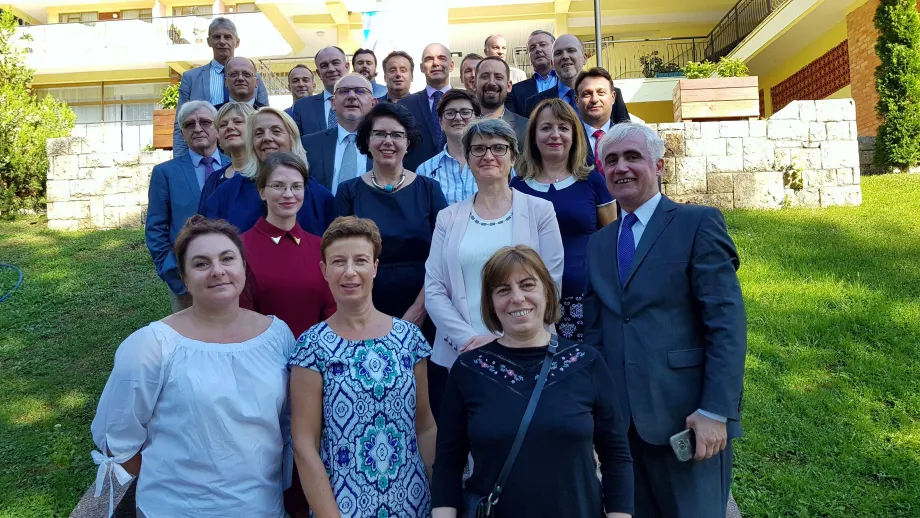The Faculty of Veterinary Medicine in Zagreb has been successfully running a prestigious international network for 10 years now
At the recently completed CEEPUS network call for applications, the VetNEST network, managed by the Faculty of Veterinary Medicine of the University of Zagreb, ranked 3rd out of 115 networks which applied. This excellent result inspired us to talk to the CEEPUS VetNEST coordinator of the Faculty of Veterinary Medicine, ass. prof. Zoran Vrbanac and find out how participation in the CEEPUS network affects the work of a university, its employees and students.

First of all, we congratulate you on the success achieved by the CEEPUS VetNEST network in the CEEPUS network call in the academic year 2021/2022. The Faculty of Veterinary Medicine has been running the VetNEST network for many years now. How did this cooperation begin?
I thank you for your congratulations. The cooperation started through the VetNEST network. For the first few years, the coordinator of the CEEPUS VetNEST programme was Austria, and since the academic year 2010/2011 the Faculty of Veterinary Medicine of the University of Zagreb.
What are the main activities of the VetNEST network and why is the cooperation between Central and Eastern European institutions in the field of veterinary medicine important for the participating educational institutions?
VetNEST is a network of veterinary faculties/universities founded in 1993, in which, as part of the CEEPUS programme today, 12 Central and Eastern European countries - Poland, the Czech Republic, Slovakia, Austria, Slovenia, Hungary, Croatia, Bosnia and Herzegovina, Serbia, Northern Macedonia, Albania and Kosovo* are participating in. Educational institutions have a long-standing historical and strategic cooperation that has led to the formation of the network. Through the CEEPUS programme, we implement activities such as mobility of students, teachers and especially important summer schools.
What impact did participation in the CEEPUS network have on the Faculty of Veterinary Medicine? How is the network used by students and your fellow teachers at the Faculty of Veterinary Medicine?
International cooperation is of great importance for the Faculty of Veterinary Medicine, as it has enabled the training and acquisition of new experiences for undergraduate and postgraduate students. Through mobility, teachers transfer their knowledge and skills in the field of their specialisation in a well-directed manner.
Why do foreign students and teachers often choose mobility at the Faculty of Veterinary Medicine, among other institutions participating in the network?
In addition to the equipped clinics and institutes and specialists in various disciplines, the Faculty of Veterinary Medicine also offers a complete curriculum in English. I believe these are all sufficient reasons for a large number of incoming students to our institution. Also, let's not disregard student experiences and promotion in this regard for future incoming students on a scholarship.
How demanding is it to be the coordinator of a CEEPUS network? What are the main challenges and what are the advantages and interesting things you would like to point out?
Network coordination is a responsible and demanding task, but I have to admit that the VetNEST network has a long tradition of excellent inter-institutional cooperation, which makes my job much easier. Coordination meetings are held several times a year, we are often in touch and many have become my friends over the years. Of course, deadlines are the main challenge, since most of the coordinators are also teachers and they perform network-related tasks as an additional activity. Each meeting is interesting, and the trips are simple because we are in a relatively small, close area. Unfortunately, we haven't seen each other lately, so some network members reminded us of previous meetings with a large photo gallery, so we wanted to meet again as soon as possible.

What challenges have you been facing over the past year since the Covid-19 pandemic began? Do you find a way to continue the long-term cooperation with network partners despite restrictions?
I have to emphasize that as a coordinator I am very proud that as a network we have managed the new situation readily and responsibly. During the first lockdown, we were in contact even during the night. Cancelled flights, cancelled bus lines, closed student restaurants - we faced it all, but all students were taken care of and they returned home safely. We tried to adjust to the situation and this is supported by a figure of almost 60 % of realised network mobilities.
Why, in your opinion, is it important for students and teachers to participate in mobility in any programme?
Mobility at many levels opens up new perspectives and insights, from getting to know the new environment, culture and customs, approach to teaching, organisation of the receiving institution, meeting colleagues and sharing experiences. I would recommend to all those thinking about the experience of mobility in a programme to do it.
CEEPUS (Central European Exchange Programme for University Studies) is a regional mobility programme in higher education. CEEPUS aims to improve cooperation in the field of higher education and related scientific activities, with emphasis on inter-university cooperation and mobility. Croatia has been participating in CEEPUS since 1995 and has been recognized at numerous higher education institutions in Croatia as a well-established, simple and useful instrument for the development of inter-university cooperation in the Central and Eastern European region. In addition to Croatia, the following countries traditionally participate in the programme: Albania, Austria, Bulgaria, Bosnia and Herzegovina, Montenegro, the Czech Republic, Hungary, Macedonia, Poland, Romania, Slovakia, Slovenia and Serbia, Kosovo and Moldova.
Thematic CEEPUS networks, partnerships of similar higher education institutions from participating countries are the backbone of the programme. In the next academic year, Croatian higher education institutions will participate in 74 CEEPUS networks, and in eight of them, Croatian higher education institutions have the role of the main coordinator. In May, a call for applications for network mobilities in the next academic year will be launched.

